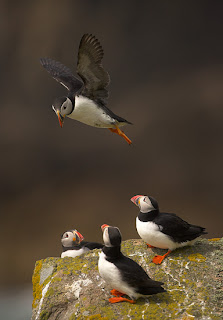Wildlife photography is regarded as one of the more challenging forms of photography. As well as needing sound technical skills, such as being able to expose correctly,
Wildlife Photographers generally need good field craft skills. For example, some animals are difficult to approach and thus a knowledge of the animal's behavior is needed in order to be able to predict their actions. Photographing some species may require stalking skills or the use of a hide/blind for concealment.(Wikipedia).
Photographs of animals and birds, you will need to learn quickly to set up and framing your images. It is very useful to practice taking shots of your cats and birds in the garden or in the park. You need to predict their behavior and then react quickly to get good pictures. Here are a number of tips on how to get excellent photographs of animals and birds in the wild.
 |
| "Eagle Portrait" captured by Richard Vier (Click Image to See More From Richard Vier) |
- Practice taking photos of moving targets. Learn to pan the moving targets, this will let you take spectacular photos with a sense of speed.
- Have the camera handy and ready for unexpected encounters. Be sure you have charged the camera batteries fully and have plenty of memory or film.
- Before you go into a place, you can read about what kinds of animals and birds are usually found there. Learn everything you can about these birds and animals. This will help you get familiar as to where to find these animals and birds.
- Learn to move and walk quietly and try to freeze your position so that your presence is not surprising or threatening to animals.
- Learn how to be aware of everything around you with your senses. With more practice, you will have the opportunity to be attentive of small movements, strange sounds or colors, smells can even tell you something about the presence of a bird or an animal, even when they are in camouflaged.
- Hiking with an awareness of your environment improves your experience. In the wild, the telephoto lenses are a necessity. This puts you a bit closer without having the animals become restless. Using a tripod is not always necessary if you have an adequate amount of light, you can shoot a fast shutter speed to get rid of camera movement. A few telephoto lenses have vibration reduction technology, but are much more expensive.
- Wear clothing that will help you blend into your surroundings. Stay away from bright colors. Also wear clothing that does not make noises when you walk, such as the nylon jackets and pants.
- When photographing animals and birds, be certain that the focus is more acute in their eyes.
- Take photos of small animals from a lower angle.
- The best time of the day for watching and photographing wildlife are early morning and just before dark. That is when nature is usually most active while the light is dramatic.
- Try to keep the sun behind you so that the light falls directly on the subject.
 |
| Photo captured by Toni (Click Image to See More From Toni) |
Lets take a look samples of Wildlife Photograpy from John Hyde on his Photo galery.
related article: How to Become a National Geographic Photographer
Author
J Arthur Davis has been a practicing professional photographer for over 48 years, and writes articles on many subjects. For additional information on his professional printing services check out http://www.artreproservices.com.
You can also check out his photography at http://www.jarthurdavis.com.
















